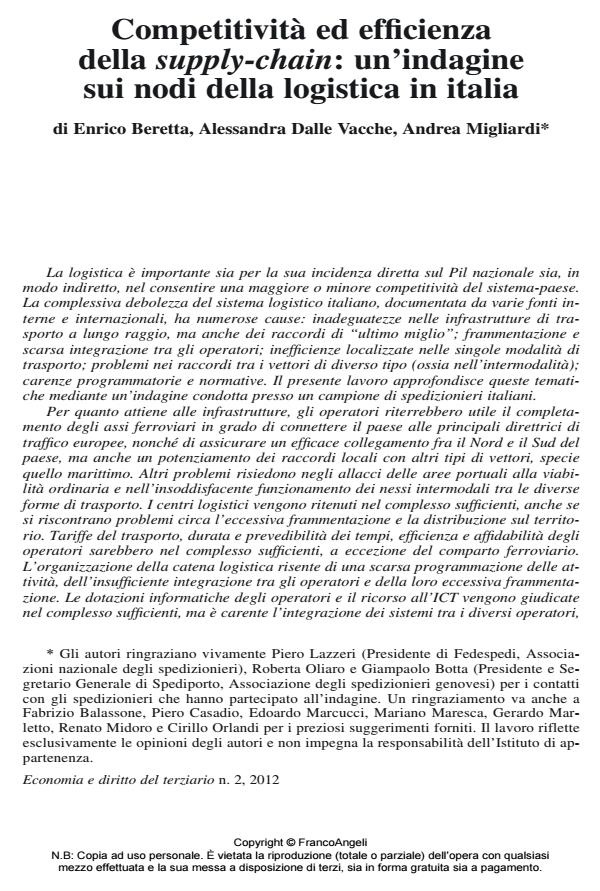Competitività ed efficienza della supply-chain: un’indagine sui nodi della logistica in italia
Journal title ECONOMIA E DIRITTO DEL TERZIARIO
Author/s Enrico Beretta, Vacche Alessandra Dalle, Andrea Migliardi
Publishing Year 2012 Issue 2012/2
Language Italian Pages 39 P. 135-173 File size 226 KB
DOI 10.3280/ED2012-002001
DOI is like a bar code for intellectual property: to have more infomation
click here
Below, you can see the article first page
If you want to buy this article in PDF format, you can do it, following the instructions to buy download credits

FrancoAngeli is member of Publishers International Linking Association, Inc (PILA), a not-for-profit association which run the CrossRef service enabling links to and from online scholarly content.
Logistics is relevant both for its direct and indirect contribute to Italian GDP and for its impact on the Country competitiveness. Weakness of Italian logistics, as reported in institutional and international documents, depends on: inadequate infrastructures; problems in the connections; fragmentation of operators; inefficiency in single transportation services; lack in programming and regulation framework. This paper focuses on these subjects by presenting the results of a survey conducted on a sample of national and global forwarders. In the forwarders’ view, priority should be given to the rail Trans European Network completion, to the rail services between the Northern and the Southern part of the Country and to the local intermodal connections. "Last mile connections" in ports areas and intermodal services represent other problematic issues. The territorial distribution of logistics centres is considered too fragmented. Forwarders consider tariffs, timing and operators’ efficiency and reliability adequate, with the relevant exception of rail service. The supply-chain organization is not optimal due to lack of programming and to the fragmentation of operators. Endowment and use of ICT are adequate, but integration between different operators’ systems is scarce. Our survey reveals some policy issues. Operators ask the public legislator to address innovation in the regulation framework, to enhance liberalizations and competition and to allocate funds on a few realizable infrastructural targets. Operators themselves could concentrate and rationalize their supply. Finally, national and local logistics associations should enhance an integration of different ICT systems and promote the respect of minimum standard services
- Analysis of outsourcing conditions for freight transport and logistics among manufacturing companies: insights from a review of data and a field investigation Giancarlo Bertalero, Andrea Rosa, Bruno Dalla Chiara, in Transportation Research Procedia /2020 pp.459
DOI: 10.1016/j.trpro.2020.03.039
Enrico Beretta, Vacche Alessandra Dalle, Andrea Migliardi, Competitività ed efficienza della supply-chain: un’indagine sui nodi della logistica in italia in "ECONOMIA E DIRITTO DEL TERZIARIO " 2/2012, pp 135-173, DOI: 10.3280/ED2012-002001